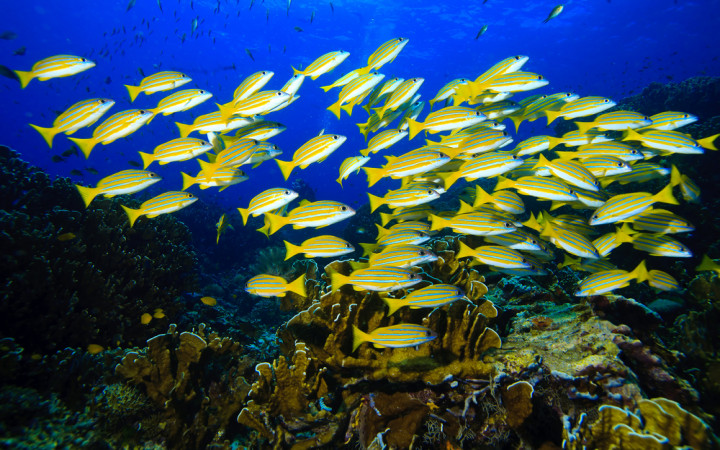Why are fish so smart? Because they swim in schools! Ha! That's an oldie but a goodie, right?
Even though many schools are out for the summer, most fish are still swimming in schools wherever they may be. Let's take a closer look at why most fish tend to stick together.
When fish stay together for reasons, biologists say they are "shoaling." If they also swim together in the same direction, they are "schooling."
So why do fish shoal and school together? The main reason appears to be that there's safety in numbers.
Staying together in schools helps to protect fish from their enemies. While a predator might easily grab a fish by itself, it's much harder for a predator to single out a victim if a fish is surrounded by hundreds of his closest friends.
Hanging out in schools also has a few other benefits. Scientists think that swimming close together may reduce friction in the water and make it easier for fish to swim and conserve energy.
When it's time to eat, it's also easier to find food as a group. A lone fish might be able to find a meal on his own, but having hundreds of sets of eyes and noses on the prowl for food is even better.
Not all fish shoal or school, though. Scientists estimate that at least 80 percent of all fish will school at some time in their lives. Some fish — often larger species — choose to live solitary lives.
If fish do decide to school, exactly how many fish does it take to be a school? While there's no magic number that equals a school, there would usually need to be at least five or more fish to be considered a school.
In the wild, though, fish schools can be huge. In large bodies of water, schools of fish numbering in the hundreds or even thousands are not uncommon.
If you've ever seen a huge school of fish swimming together in unison, you may have wondered how they keep from swimming into each other. Scientists believe fish use a combination of all of their senses to keep track of the movements of the fish around them.
Having eyes on the sides of their heads helps fish easily to see what's going on around them. Sight isn't the only tool fish use, though. They also use hearing and even their sense of smell to stay with the group.




